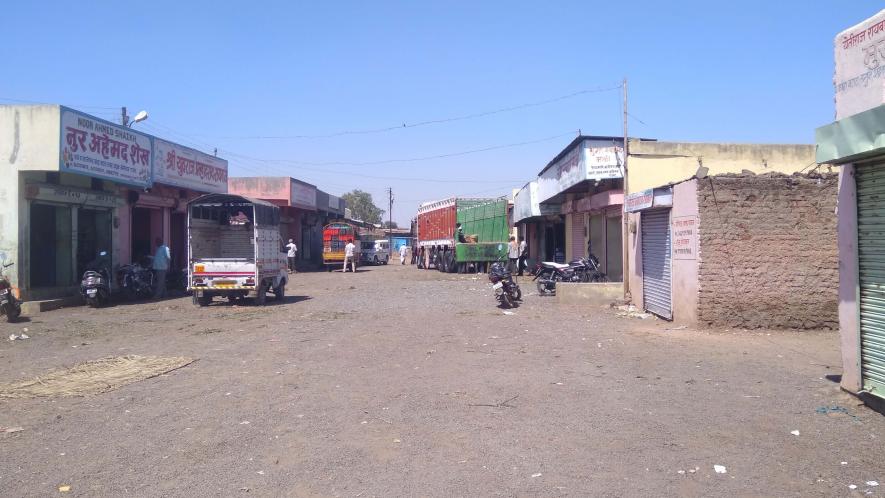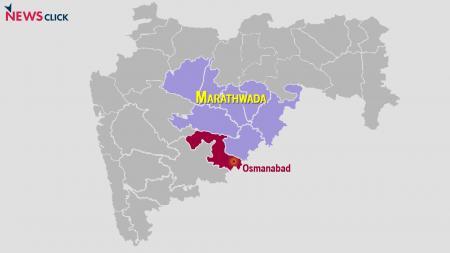#MahaDrought: The Empty Market Yards of Osmanabad

Osmanabad market yard
[Maharashtra is facing one of the most severe droughts since 1972, with the state government declaring drought in 180 tehsils out of 350. Entire Marathwada (spread across Southern and Eastern Maharashtra) region is in dire condition now. This is Part 2 of the series of ground reports by NewsClick.]
Osmanabad: The severe drought conditions in Maharashtra has affected the rural economy very badly. The agriculture-based businesses, especially the market yards for agriculture produce, have come to near stop in almost half of the state. To get a sense, NewsClick travelled to Chhatrapati Shivaji Krushi Utpanna Bajar Samiti (Agri Produce Market Committee) of Osmanabad, located in the district headquarters of Osmanabad.

Nitin Gandhi (62) is one of the oldest Aadate (Commission Agent) of the market yard of Osmanabad. He is the third generation of his family to be in this business. “I am in the commission agent profession for almost 40 years now. But the current frustration in the entire chain of this economy, from farmers to labourers to small commission agents and even big ones is totally new,” said Nitin.
He deals in a number of grains. “Now, take the example of Soya bean. Last year, I sold almost 50 thousand kilograms of soya bean every month. This went on for four months. Today, I am failing to procure even 100 thousand kg of soya bean,” said Nitin. To put it in context, soya bean is a highly sought-after crop in the drought hit area of Marathwada and Western Vidarbha in Maharashtra. This crop is getting the highest amount with minimum labour investment as compared to Tur, Harbhara or Jawar. So, one can gauge the condition of other grains in comparison with soya bean.
“Last year, we had sold almost 500 quintals of Harbhara by February end. That time the Minimum Support Price was Rs 4,400. But many agents bought it for Rs 4,000. This year, however, the situation is starkly different. We have been able to sell just 50 quintals of Harbhara till now,” said one of the commission agents in the same market on condition of anonymity.
Also Read: #MahaDrought: Without Fodder Camps, Farmers Forced to Sell Cattle at Giveaway Prices
The Marathawada region has been reeling under drought for quite some time now. The state is having one of the biggest market yards for soya bean in the country in Latur. There are several more market yards in Nanded, Jalana, Aurangabad, Beed, Hingoli and Parbhani districts, which have turnovers in crores. The Osmanabad market is comparatively smaller but significant as a major chunk of agriculture produce from the highly drought affected area comes to this yard.
Nitin Gandhi in his shop in Osmanabad.
There are total twelve establishments of commission agents in the Osmanabad market yard. Everyone is under financial distress this year due to drought. “We used to sell minimum 1,000 quintal Jawar per year. But I don’t think that the quantity will be same this year. First of all, the amount of Jawar in the field itself is lower as the farmers have not sown seeds in such large quantity. Also, there are reports that farmers are cutting their crop to give grass to their milch animals. This will certainly affect the business,” said Sridhar Kakade, another commission agent from the same yard.
The reduction of agricultural produce has also affected the labour force of the market yard in a big way. Krishna, a young labourer said that he hardly gets work in the market now. “Earlier we used to load or unload minimum two trucks per day, but now it has reduced to one truck in three-four days. That is why we are forced to go out to the city as well as other areas in search of work,” he said. Nitin too talked about the problems of labourers. He said, “Earlier, there was enough loading and unloading work for the labourers. But now, more than 20 people turn up for the work of just 5 persons.”
Also Read: Maha Farmers Left Dismayed As Agricultural Produce Prices Crash
Nitin said that the slowdown in the market has set in since the past two years, especially after demonetisation was announced by Prime Minister Narendra Modi. “This drought has just blown the last cover of an already shattered market yard,” he said. According to him and few other commission agents, the wheels of ground economy suddenly got slow after Notebandi. “People who had invested money with commission agents got into huge losses after that sudden decision. We were just recovering from the two big droughts of 2013 and 2015. But this decision came as a big blow. It dried up the flow of money from small commission agents as well as smaller vendors of almost all villages. They turned to other businesses or even to labour work. It has gradually affected us all,” Nitin said, expressing the concerns of several commission agents like him.
“In an agriculture-based society, the market yard is a place of hope for so many sections. But here, the people who run it are disempowered and tired. You can understand the situation of farmers in the area,” he said.
The hopelessness in the words of the commission agents brings the parched reality of the ground in front of us.
Get the latest reports & analysis with people's perspective on Protests, movements & deep analytical videos, discussions of the current affairs in your Telegram app. Subscribe to NewsClick's Telegram channel & get Real-Time updates on stories, as they get published on our website.
























